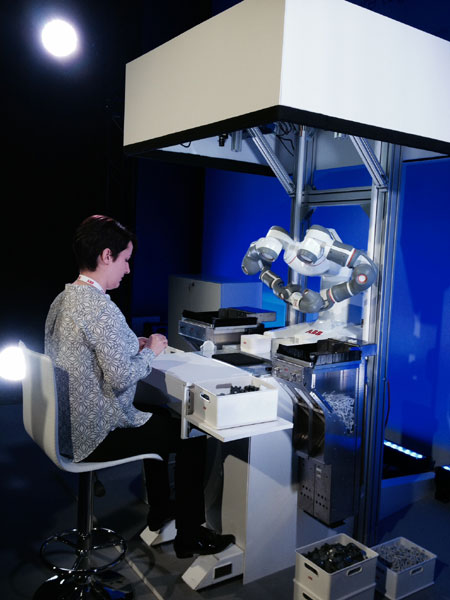Price fixing crackdown fails to faze

 |
| An ABB staff member demonstrates working with YuMi, the world’s first collaborative robot developed by the power and automation company, recently in London. Provided to China Daily |
CEO welcomes campaign and says he does not share the concerns of others
The head of one of the world's top engineering groups has thrown its support behind China's crackdown on anti-competitive practices in the country.
Uli Spiesshofer, chief executive officer of Swiss giant ABB, says that despite growing concern internationally that China is targeting foreign companies in its anti-trust inquiries, he congratulates the Beijing government on its actions to make the market more competitive.
ABB is confident about its development in China as it continues to roll out its future development strategy, he says.
"I do not share the same concerns," says Spiesshofer, speaking during the company's annual Capital Market Day briefing in London. "I would like to congratulate the Chinese government for its actions in taking Chinese business practices to the next level. These are efforts that we welcome."
"ABB differentiates itself from the competition on technology, on customer intimacy, and value, and we are ideally positioned, especially in the new context, to be a strong partner," Spiesshofer says of its relationship with the world's second-largest economy.
ABB will continue to listen to the Chinese government and stay abreast of its long-term plans, and will continue to make available the right technology to support China.
Spiesshofer also used the event to announce the Swiss group would buy back $4 billion (3.1 billion euros) of shares, seen by observers as a sweetener after a series of problems at its power systems unit and in the face of sluggish global growth.
Presenting his new strategy a year after taking the helm, Spiesshofer also cut the Zurich-based company's medium-term sales and profit forecasts to reflect the fact slower economic growth has crimped capital spending.
ABB's businesses range from industrial robots to power grid transformers, but it now plans to offload operations considered to be outside its main areas of expertise.
The share buyback will run over two years, and some of the proceeds of the sell-offs will be paid back to investors, who have been unsettled by a series of charges related to delays to offshore wind farm projects.
ABB has raised more than $1 billion from the sale of five businesses over the past year.
In recent years it has faced slower-than-expected economic growth, which prompted some of its customers to delay big-ticket capital spending, and led the engineering firm to cut its sales growth target to 4-5 percent for this year in February.
The company said on Sept 9 it expects sales to grow 4-7 percent a year on a like-for-like basis during 2015 to 2020, faster than global economic growth forecasts, but below its previous mid-term goal for annual sales growth of 5.5 to 8.5 percent.
It is now aiming for core profit margins of 11 to 16 percent over the same period.
However, the chief executive stresses that China would continue to be an important market, and a platform to take the company to the next level.
"China has been an important market for ABB for more than 100 years, and it will be a very very important market for us in the next-level strategy."
"Not only as a market where we can sell a lot of our offering, we have in China a fantastic technology base."
ABB employs more than 2,000 R&D staff in China at various sites and provides its Chinese customers with a wide portfolio of power and automation equipment, through a total workforce in the country of 19,000 people in 109 cities. The group operates in 100 countries and employs 145,000 people worldwide.
Its revenue in China last year was $5.4 billion, about 12 percent of its group total, of which 40 percent was from power, and the rest from automation divisions.
During the year, it invested about $1.8 billion in China, it says.
Despite the recent slowdown in Chinese economic growth Spiesshofer believes that China's 12th Five-Year Plan (2011-15) offers new opportunities for his company.
Today's Top News
- New engine powers cargo drone expansion
- China to boost intl cooperation on green tech
- Factory activity sees marginal improvement in November
- Venezuela slams US' 'colonial threat' on its airspace
- Xi: Strengthen cyberspace governance framework
- Takaichi must stop rubbing salt in wounds, retract Taiwan remarks






























